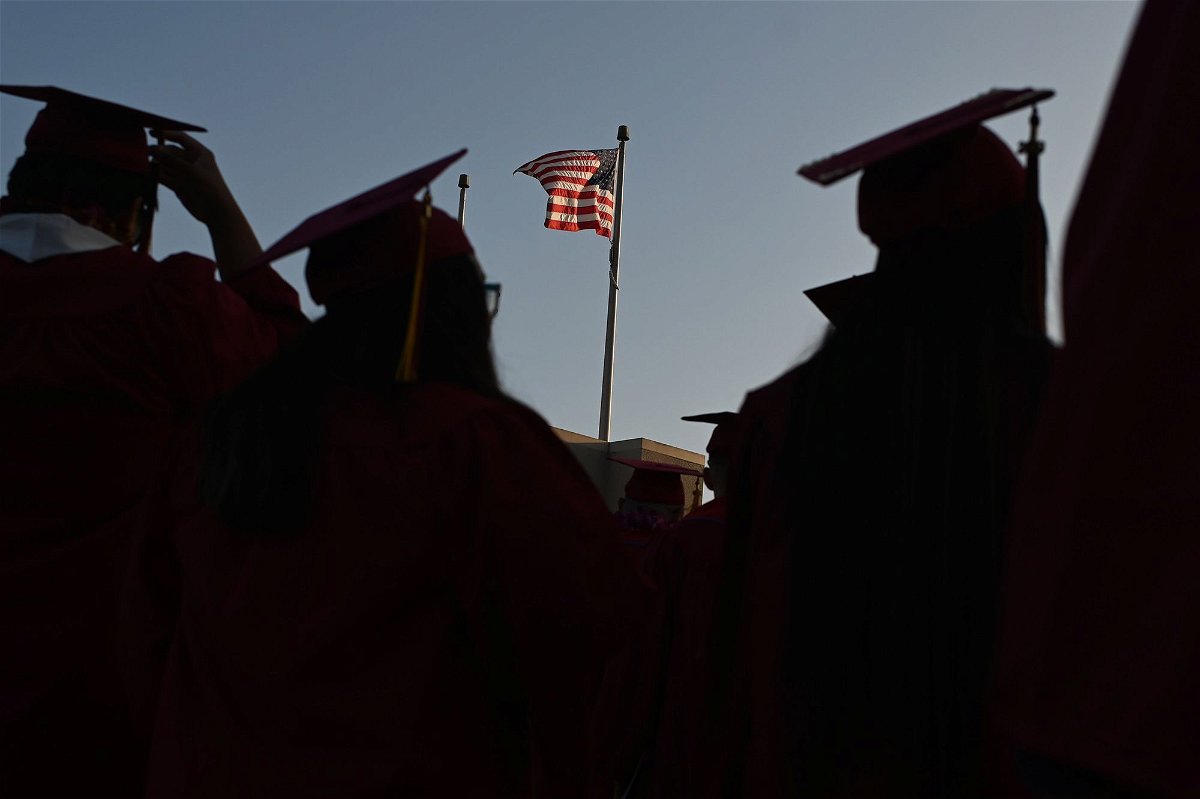Student debt is haunting Americans from graduation to retirement

Nearly three out of four Americans who took out student loans say their debt has forced them to delay a major life event
New York (CNN) — Going to college is supposed to be the path to a more prosperous life. But the cost of getting a degree has become a financial albatross, weighing down borrowers from the day they graduate to the day they retire — if retirement is even possible.
Student loan debt is a burden that nearly 3 out of 4 American borrowers say has forced them to delay a major life event — whether that’s buying a house, having kids or getting married, according to the latest Gallup Lumina Foundation Cost of College report.
“I’ve had to just put all of my dreams aside and focus on surviving day to day,” Jes Evans, 35, told CNN. She earned a master’s in religious studies in 2017, with dreams of teaching at a college. But she couldn’t find any jobs in her field when she graduated and struggled to find jobs in other areas where she lacked experience.
Evans, who now works as a director of youth programs and communications at a church north of Pittsburgh, feels trapped by her debt, for which she pays $940 a month.
“It just feels like you’re treading water your whole life … I can’t travel, I couldn’t really have a family because I couldn’t afford it. It’s just a slog.”
Evans is far from alone.
Dozens of people who responded to a CNN prompt on social media this week said their student debt has hammered their credit score and drained their income. Many who responded said they were nearing retirement age but couldn’t imagine being able to stop working, saying they would take their debt to their grave.
“Cost is the No. 1 issue when people say they’re not going to pursue postsecondary education,” said Courtney Brown, who has been leading the Gallup Lumina study for the past four years.
“When people have this debt, not only are they not having children, they’re not buying homes, they’re also not starting their own businesses,” Brown said in an interview. “And that will be a problem — we need our local businesses, we need innovation, and that’s another thing that’s going to hurt us.”
One in 3 students in the United States currently enrolled in college or other post-high-school program say they have considered stopping their coursework over the past six months, the Gallup Lumina poll found. Among those, 31% blame the cost — the third-most cited factor behind emotional stress and personal mental health reasons.
“People want to get a degree — it’s not that they don’t value it,” said Brown, the vice president of impact and planning for the Lumina Foundation, a nonprofit that aims to increase participation in education beyond high school. “I think they’re increasingly frustrated, not only because it costs so much but it’s confusing to understand how much it costs.”
The limits of debt relief
Spiraling tuition costs have begun to change the narrative around the value of a college degree. In 2015, more than half — 57% — of Americans had “a great deal” or “quite a lot” of confidence in higher education, according to a separate Gallup study. Last year, that figure hit a new low of 36%. That Gallup study didn’t focus on the cause of the eroding confidence, but it said that rising costs “likely play a significant role.”
Part of the problem is the scale of the higher education system in the US, where hundreds of nonprofit colleges are competing for enrollment and talent, and a large proportion of upper- and middle-class parents are willing to pay top dollar — or even go into debt themselves — to give their kids the best education possible.
Some critics of the Biden administration’s student loan forgiveness plans say that wiping out the debt doesn’t fix the root cause — and in fact could encourage universities to raise tuition even further.
The White House has forgiven a staggering $153 billion in federal student loan debt, giving a financial lifeline to millions of borrowers.
When Josh, who lives in Oregon and asked CNN not to publish his last name, received an email from the Department of Education last week, he said his first reaction was, “What the heck do they want now?”
But he soon learned there was good news: He’d qualified for loan forgiveness.
“To read the words that I now qualified, having reached the number of monthly payments … I was just blown away,” he said. “I can’t begin to describe how it feels to have this glimmer of hope that 24 years of struggle is possibly coming to an end.”
Josh says he’s not allowing himself to get his hopes up just yet, noting that there are already two lawsuits challenging Biden’s SAVE plan. But in moments when he lets himself imagine his life without debt, he dreams of finally buying a home with his husband.
The dream of retirement
As striking as Biden’s $153 billion in forgiven debt is, it is less than 10% of the trillion-plus dollars in outstanding federal debt.
Since 2007, borrowers who work for the government or a nonprofit have been able to lighten their debt load through the Public Service Loan Forgiveness program. But not all public sector workers are eligible.
Amy Coody, a social worker at a maximum-security women’s prison in Wetumpka, Alabama, says she is ineligible for the PSLF program because she’s employed through a third-party contractor rather than directly by the state.
“Even though I’m in the prison and dealing with the inmates, they said that that’s not public service,” she said in an interview. “I’ve been paying on my loans for 21 years, and I’m never going to be able to retire at this rate.”
Borrowers who took private loans or moved their debt to private lenders to consolidate it also aren’t eligible for loan forgiveness.
That’s an acute frustration for Ralph Davis, a 64-year-old chiropractor from Savannah, Georgia. Davis said he doesn’t begrudge anyone lucky enough to have their debt wiped away. But he can’t help see “sort of an essential unfairness” within the Biden programs.
Davis graduated from chiropractic college in 1986, with about $30,000 in debt from federal student loans. At the time, he was advised to consolidate those debts through a private lender. He later amassed $40,000 in debt trying to get an additional degree through a for-profit college, though he eventually gave up on the degree when the college kept changing the curriculum to move the finish line forward.
But because Davis consolidated his debt through a private lender, he’s not eligible for federal forgiveness programs.
He isn’t bitter about it, and he’s not counting on a magic wand to come and zap his debt away. But he is conscious of being left out, resigned to the reality that it may take nine more years before he can finally pay off his loans.
“I did freely enter into these arrangements in order to advance my career — nobody tied my hands and said, ‘sign here,’” he told CNN. “And I have faithfully from the day I graduated my doctoral program in ’86, through the additional education … even during the pandemic.”
But over the past four decades “basically, every dime I’ve paid has gone to interest,” Davis said. “And of course, that does tend to put retirement ideas a little bit on hold.”
The-CNN-Wire
™ & © 2024 Cable News Network, Inc., a Warner Bros. Discovery Company. All rights reserved.



